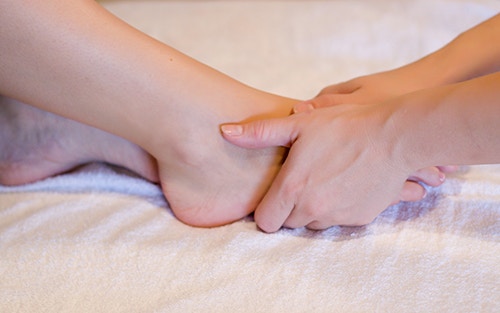Prevent your stress from reducing your productivity at work while debilitating you at home. Knowing how to take the edge off and relieve stress will enhance your health and well-being.

yourfootpalace.com gathered the following information about the physical effects stress can have on your body and 11 ways to lower your stress level.
What Does Stress Do To the Body
Occasional or well-managed stress is to be expected throughout phases in your lifetime. However, stress can be a problem when it becomes the only way you can problem-solve. The following are ways constant stress can affect your body:
- Random aches and pains
- Chest pain (angina) or a feeling that your heart is racing
- Exhaustion or difficulty sleeping
- Sexual dysfunction
- Headaches, dizziness, or shaking
- Elevated or high blood pressure
- Muscle tension or jaw clenching
- Stomach or digestive irregularities
Note: Stress often leads people to manage it with unhealthy, more destructive behaviors like:
- Smoking
- Using illicit or abusing prescription drugs
- Drinking alcohol too much or too often
- Gambling
- Overeating or developing an eating disorder
As problems with stress and its effects on the body worsen, you must find innovative ways to reduce your stress level once it is identified. Here are 11 ways to successfully relieve stress:
1. Reduce Caffeine Consumption
Caffeine is a stimulant found in varying quantities in coffee, tea, chocolate, and energy drinks. High doses or continuous consumption can increase anxiety. Different individuals have different thresholds for how much caffeine they can consume and tolerate. Once you notice that caffeine makes you nervous, jittery, or anxious, cut back your consumption.
2. Exercise
Virtually any form of physical activity can act as a stress reliever. Even if you’re not an athlete or you’re out of shape, exercise can still be a good stress reliever. Physical activity can increase your endorphins and other natural neural chemicals, enhancing your feeling of well-being.
- Housecleaning
- Bicycling
- Swimming
- Weightlifting
- Walking
- Hiking
- Jogging
- Gardening
Note: If you have a medical condition or take prescription medication, consult your physician to see if there are limits (if any) to the type and duration of your physical activity.
3. If You Smoke or Chew Tobacco, Stop!
Some people use smoking as ‘self-medication’ to counter stressful feelings. However, science and biology show that smoking adversely increases anxiety and tension. Nicotine creates an immediate sense of relaxation, so people continue smoking with the belief it reduces stress and anxiety.
Note: A long-term smoking addiction may lead to more severe conditions like heart disease, lung disease, diabetes, stroke, and cancer.
4. Take a Vacation or Travel

A study released by the American Psychological Association concluded that vacations can reduce stress by removing people from the activities and environments associated with daily or frequent stress and anxiety.
5. Reduce or Cease Alcohol Consumption
You may believe a drink or two can help you relax. However, over time, regularly consuming alcohol to deal with feelings of stress can interfere with what your brain needs for good mental health and disrupt your sleep, making stress harder to cope with.
6. Visit Your Chiropractor
Chiropractic treatments can help relieve the symptoms of chronic stress. In addition, regular chiropractic adjustments can soothe the nervous system and lessen the flight or fight response most of us naturally experience when stressed. Chiropractic care may also contribute to the following:
- Easier breathing
- Improved balance
- Healthier pregnancies
- Improved asthma control
- Lowered/better-regulated blood pressure
- Improved digestion
- Increased energy levels
Note: When starting a new treatment plan, it’s typically recommended to have adjustments multiple times a week. However, as your body begins to heal, that frequency could drop to just once a week. Eventually, when you are pain-free and simply want to maintain your flexibility, you may only need to get an adjustment once or twice a month.
7. Schedule Regular Spa Days
Spending time relaxing in therapeutic baths can prompt physical changes resulting in mental benefits like reduced stress and anxiety with increased relaxation. Spending a care-free day at the spa enjoying a deep tissue massage can also release any built-up stress that manifests as tightened muscles in your neck, back, and shoulders.
8. Schedule Frequent Reflexology Massages
A massage can help reduce muscle tension. This is why it may help relieve some symptoms associated with stress and anxiety.
A reflexology massage is the application of pressure to specified areas on the feet, hands, and ears, giving it the ability to alleviate or reduce stress. Furthermore, reflexology may also reduce pain, anxiety, and depression, while enhancing one’s relaxation and sleep.
9. Adopt an Activity or Hobby
People who participate in activities or hobbies are much less likely to suffer from stress, anxiety, “down” mood, and depression. Activities or hobbies that get you outside can make you feel happier and more relaxed.
10. Read a Book
Research indicates that reading fiction is much more effective at reducing stress and anxiety than listening to music, drinking tea, and even taking a walk. In fact, stress levels dropped by 68% after merely reading. While your brain is engaged in the story, your heart rate slows down, and your muscles tend to relax.
11. Do Nothing
When you find yourself down, stressed with work, or exhausted from daily stress and anxiety, especially for those working from home, doing absolutely nothing is an excellent way of psychologically detoxing. Just take a break from doing anything. This is referred to as decision avoidance.
Stress and Anxiety Relief
In this article, you discovered some of the adverse effects stress and anxiety can have on the body and 11 ways to effectively relieve them.
Knowing how to manage your stress level can help you work, problem solve, and communicate with others in a more proficient and coherent way.
Ignoring stress and anxiety can lead to severe health problems requiring medical intervention to control them.
Sources:
my.clevelandclinic.org/health/articles/11874-stress
mayoclinic.org/healthy-lifestyle/stress-management/in-depth/stress-relievers/art-20047257
stress.org/workplace-stress
(706) 521-5290
(678) 963-5958